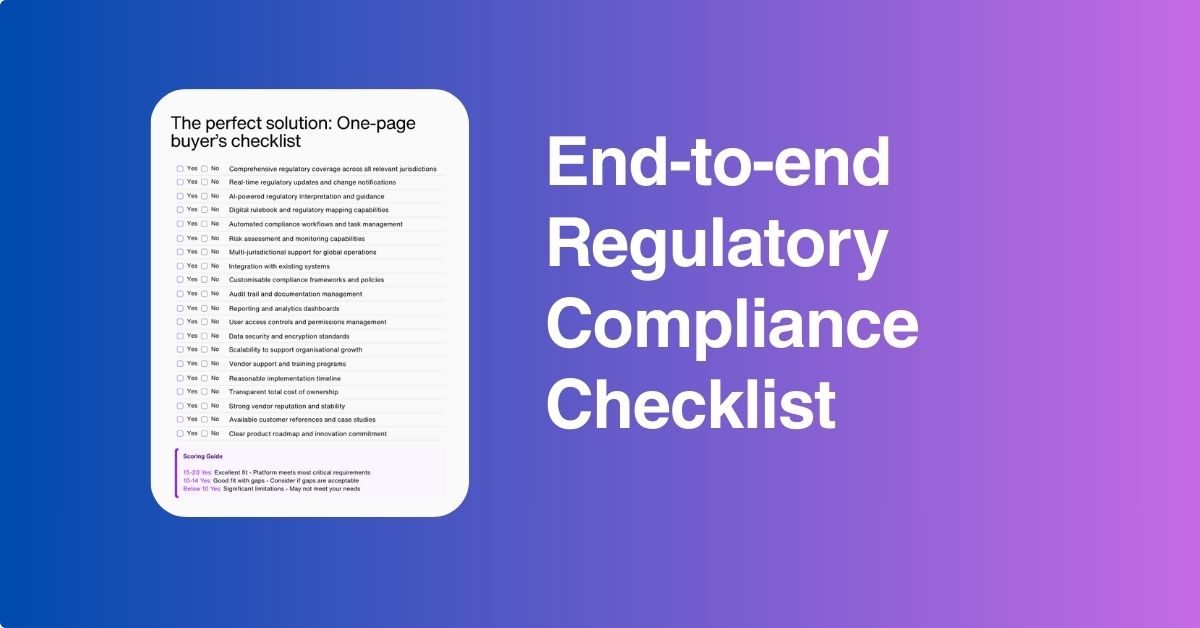During the Glasgow COP26 summit, several countries, including the UK, renewed their commitment to the fight against climate change.
Following the event, the UK government announced plans to introduce new mandatory climate risk disclosures in April 2022, making Britain the first G20 country to enshrine these requirements in the law. The rulings are expected to affect over 1,300 listed companies and financial institutions.
From a regulatory perspective, the upcoming guidelines promise to bring significant changes for financial firms.
If financial firms are to meet these changes, they need to provide clear, comprehensive, and high-quality information to managers and stakeholders and implement workflows to keep track of all regulatory changes.
However, this is a complex task that can’t be performed efficiently with legacy compliance technologies, making modern compliance challenging.
Given this context, embracing modern RegTech platforms can revolutionise regulatory compliance tracking by making it more modern and efficient.
Challenges impacting regulatory compliance tracking in the modern environment
Siloed compliance processes and technologies
In most cases, compliance processes are seldom created with a larger aim or objective in mind but as a short-term response to a specific event.
But, this short-term approach to compliance has created a series of rules, litigation conditions, and investigative processes that have little connection with each other, creating a convoluted regulatory environment where compliance teams have to work harder and longer to track compliance changes and create workflows to ensure their organisations are meeting regulatory requirements.
When compliance functions are disconnected, the technology used to complete them also develops a similar discombobulated pattern, further complicating regulatory compliance.
As a result, tasks become even more complex.
For instance, tracking compliance status across multiple business lines, functions, or locations becomes a difficult undertaking because there is no way to share the data between the platforms, hurting response times.
Furthermore, valuable, time-saving functions such as compliance mapping are not accessible to all personnel across departments, further delaying compliance.
Out-dated compliance tools
Compounding the problems of regulatory compliance tracking is the type of technology used.
While spreadsheets may have worked once, they are not suitable for the modern regulatory environment. This dependence on outdated technology presents a unique set of challenges.
For example, compliance teams spend a significant amount of time compiling reports. In fact, 40% of compliance teams spend over four hours a week creating and amending reports for company boards.
Furthermore, most reports lack key insights and sophisticated analytics to lend any value to the compliance process.
How does RegTech revolutionise compliance tracking?
By leveraging modern technologies such as AI, NLP, and advanced analytics, RegTech solutions are far better suited for meeting modern regulatory challenges.
Here’s how they can transform compliance tracking:
Obtain specific and relevant results
RegTech platforms can convert regulation from a complex, convoluted process into an automated procedure, opening up financial organisations to efficiencies and gains they would not have been privy to with other solutions.
Thanks to RegTech solutions, compliance texts detailing regulatory updates can be structured and consumed in a meaningful way, allowing for much more accurate and efficient tracking of compliance requirements.
The platforms can deliver accurate and specific answers even when collecting data from different sources and formats.
With the modern regulatory environment subject to frequent updates, a solution that accounts for the latest changes and alerts compliance teams in real-time can speed up compliance processes by improving the accuracy of compliance workflows.
Map internal business processes to regulatory requirements
RegTech solutions allow businesses to perform regulatory mapping where organisations can align financial laws with their internal business processes.
With these solutions, regulatory teams can track their compliance processes efficiently and find compliance gaps that are created by regulatory updates.
Personnel can quickly map the new updates to business functions to ensure they are making amendments to meet the new requirements, allowing organisations to be in a constant state of compliance.
Can you meet contemporary compliance tracking challenges with RegTech?
Regulatory developments such as the hybrid working model and the COP26 summit indicate that significant regulatory updates are approaching, and financial institutions must abide by these updates.
If financial institutions are not ready, it could jeopardise their ability to respond to new regulatory updates, identify regulatory gaps, and ensure compliance.
The good news is that RegTech platforms can revolutionise regulatory compliance tracking by transforming compliance into a simple, scalable, and efficient process.
Leveraging the right solution can help you convert your compliance procedures into an agile process that can respond better to rapid and frequent updates, and thus, meet the challenges of the modern compliance environment.




